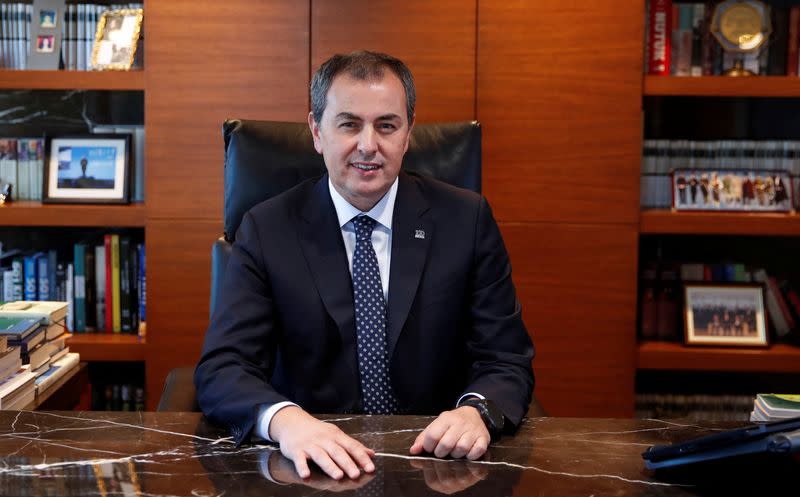Turkey's Isbank CEO sees challenges ahead, November rate cut

By Ebru Tuncay
ISTANBUL (Reuters) - Turkish banks will pay the price throughout next year as challenges linger from the country's economic turnaround, the chief executive of lender Isbank said in an interview, adding he expects the central bank to begin cutting interest rates this November.
CEO Hakan Aran told Reuters that Turkey's largest private bank by assets plans to expand its footprint in payment system infrastructure, digital platforms and service banking, where it will make new partnerships and acquisitions abroad.
The growth plan comes as Isbank marks its 100-year anniversary, and as Turkish authorities seek to stamp out soaring inflation with high interest rates and other tightening measures that have squeezed financial-sector balance sheets.
"I think difficulties will also continue throughout 2025. We all will continue to pay the price for the sake of ensuring price stability and lowering inflation," Aran said in the interview at Isbank's Istanbul headquarters.
"Banks will overcome this process with a deterioration in net interest margin this year, and a deterioration in the asset quality next year."
Asset quality already began eroding in July, while net interest margins are under serious pressure, Aran added.
"Banks' return on equity is decreasing. If we were mandated to do 'inflation accounting', many banks would probably be reporting losses," he said. "Banks seem to be profitable right now because there is no inflation accounting."
The government last year excluded banks from companies applying inflation-adjusted accounting methods to their balance sheets over concerns it would result in tax revenue losses.
Since June last year, the central bank has hiked its policy rate to 50% from 8.5% to reverse years of unorthodox easy-money policies under President Tayyip Erdogan, who supported the U-turn.
Inflation dipped below 62% last month and is expected to continue easing, setting up potential rate cuts in the months ahead.
Aran predicted the central bank would begin easing monetary policy in November with a 250 basis-point cut, roughly in line with analysts' expectations. The rate would fall to 45% by year end and to 25% by end-2025, he predicted.
ANNUAL INFLATION
September inflation data, released in early October, will "most probably see annual inflation below 50%, while the policy rate would remain above that. So I think there could be a gradual rate cut starting ... in November," Aran said.
Inflation has remained well above the central bank's 5% target for years. Aran predicted a drop to about 42% by year end and to 20% a year later, a bit higher than official forecasts.
He said household price expectations should converge toward the much lower central bank expectations in 2025.
The central bank will maintain its tight monetary policy stance unless there is an "extraordinary" risk, or re-emergence of a dollarisation trend, Aran said.
He sees the lira weakening to 38 to the dollar by end-2024. It touched 34 for the first time on Friday.
Isbank, founded in 1924 to primarily fund industrial development and expand household savings, now has a market value of nearly $10 billion. It has ambitious international plans.
CEO since 2021, Aran said the lender aims to be among the top banks globally, in terms of the breadth of geographies in which it operates and the number of clients it serves.
Isbank is evaluating possible acquisitions and partnerships related to digital banking and payment systems abroad, especially in the United Kingdom and European Union, he said.
In the medium term, he said, a significant portion of income would come from payments infrastructure, digital and service banking. Isbank also aims to be a regional fintech hub, boosted by the recent merger of its subsidiary Moka Payment Institution with Birlesik Odeme Hizmetleri, he said.
"Currently, 90% of income comes from traditional banking and 10% from such new platforms," Aran said. "We are taking steps to bring this ratio closer to each other in the next five years."
(Reporting by Ebru Tuncay; Writing by Huseyin Hayatsever; Editing by Can Sezer and David Holmes)